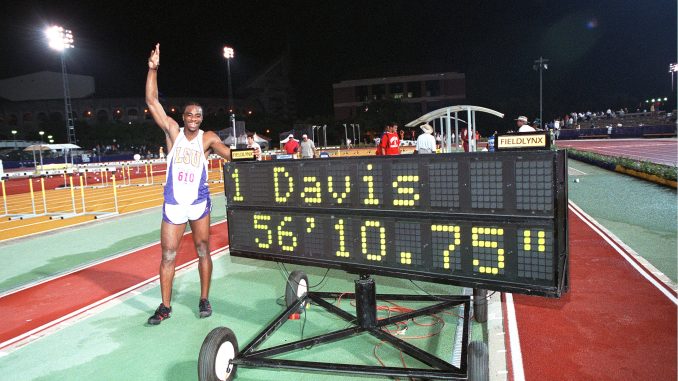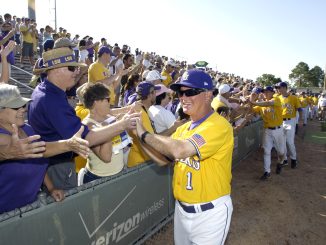
(Editor’s Note: This is the first in a series of former athletes with ties to LSU that will be inducted into the Louisiana Sports Hall of Fame in Natchitoches on July 29. Today: Walter Davis).
By SHELDON MICKLES, Written for the LSWA
Looking back on the totality of his track and field career, it seems nearly impossible to think that it almost didn’t happen for two-time U.S. Olympian Walter Davis.
After just one track practice in the spring of his freshman year at Beau Chene High School in Arnaudville, the affable Davis decided he would rather stick with his first love — basketball.
Years of playing against his brothers and cousins helped mold him into an all-state point guard who averaged 15 points and seven assists as a senior, which earned him an invite to the Louisiana High School Coaches Association’s East-West all-star game.
But thanks in part to the persistence of Beau Chene girls basketball coach Ken Winfrey, who also coached the jumpers on the track team, Davis’ final game came a couple of months later after he won the long and triple jump titles at the state meet.
It led to an illustrious career at Barton County (Kansas) Community College and LSU, where he became the program’s most decorated male athlete in just two seasons while leading the Tigers to two national titles. Then he began 13 years on the international circuit.
He earned a spot on the U.S. team for the 2000 and 2004 Olympic Games, the first time as a 20-year-old from tiny Leonville, Louisiana, and he won two gold medals as well as a silver and bronze at the World indoor and outdoor championships.
Davis’ all-time best in the triple jump was 58 feet, 2 inches in winning the title at the 2006 World Indoors in Moscow and his best long jump ever of 27-0 ½ netted the gold medal at the 2003 USA Championships.
That resume’ makes the long journey from tiny hometown in St. Landry Parish to LSU to track stadiums all over the globe to his induction into the Louisiana Sports Hall of Fame in Natchitoches all the more special for the 44-year-old Davis, and those who marveled at his highly-successful career.
The 2023 Induction Celebration is July 27-29, with information and tickets available at LaSportsHall.com or by calling 318-238-4255.
“Without a doubt, Walter is the best athlete I ever coached … just from a standpoint of raw talent,” former LSU jumps coach Boo Schexnayder says unequivocally. “Of course, I had other athletes that had talent as well. I never coached him, but the other freak I saw was (former LSU sprint star) Xavier Carter.”
None of it was in Davis’ plans almost three decades ago at the end of his first — and what he thought was his last — track practice after Winfrey told Davis he wanted him to come out for the team.
“So I go out my freshman year and I’m thinking I’m just going to jump,” Davis said with a laugh. “Then, he had me running the 400. That was my first and last day at practice.
“I couldn’t jump and he had me running the 400. I was like, ‘Oh, no.’”
But Winfrey knew he had to have Davis, who comes from a long line of well-known athletes.
“When I first started coaching in 1989, someone told me if I went to a school that had some athletes to look for the Davises,” Winfrey said. “If you had a Davis on your team, you were going to be all right. I found out very quick that I needed some Davises on my team.”
Joe Davis, Walter’s dad, and several of his brothers were basically basketball players, Winfrey said. But the elder Davis was also a state champion jumper at the old Leonville High School.
“I knew his dad … I followed the dad and all his uncle’s careers,” Winfrey said. “They were outstanding athletes. There were six or seven boys, and, all of them, they liked to work.”
Eventually, Walter Davis came around — especially after playing basketball games in gyms where he would look up and see the names of his dad and uncles displayed on banners celebrating their many accomplishments.
When Winfrey asked him to come back out for track for his junior season, Walter was soon running the short sprints — the 100 and 200 meters — and jumping.
“I talked to him again and he started working out with me after basketball practice,” Winfrey said. “He was a jumper and sprinter for me, and the rest is pretty much history.”
It certainly didn’t take long for the lanky kid with big-time hops to start making a name for himself in the Acadiana area — and beyond.
“He started doing things that were surprising to everybody,” Winfrey said. “He could just jump and jump and jump. Walter still was kind of hesitant about becoming a track guy.
“I’d say, ‘Walter, name a couple of people that can play and dunk and jump like you can,’” he added, noting Davis named a few and pointed at him as well. “I said, ‘Well, tell me this, Walter. … How many people in the nation you know can triple jump 51 feet?’”
After finally settling on track, it was off to Barton County.
Davis became a six-time national junior college champion in the jumps, capping his career there by qualifying for the 2000 Sydney Olympics in the long and triple jumps although he chose to compete in the latter only and finished 11th.
From there, Davis eschewed an offer from nearby Arkansas to come home and sign with LSU, where he quickly rewrote the program’s record books and helped the Tigers win the 2001 NCAA indoor and 2002 NCAA outdoor titles.
Even though he had already competed on the biggest stage at the Olympics, his first fall training season on the LSU campus was an eye-opening experience.
“My first year in Baton Rouge was kind of interesting,” Davis said on his induction into the LSU Athletics Hall of Fame in 2019. “It was a new coaching philosophy; I had never done the stuff that they were instructing me to do. But looking back on it, I’m so glad I just went with it.”
Did he ever.
A nine-time All-American under legendary coach Pat Henry and Schexnayder, a world-renowned jumps coach, Davis won six of a possible eight NCAA horizontal jumps titles in his two seasons. He also ran the leadoff leg on the 4×100-meter relay team that won the 2002 national title with a time of 38.32 seconds.
In that 2002 NCAA meet held in LSU’s Bernie Moore Stadium, the last time he pulled on a purple and gold uniform, Davis put together a memorable performance for the home fans when he scored more than a third of the Tigers’ 64 total points.
He took the long and triple-jump titles and his 2½ points from the relay gave him a total of 22½, contributing the way no male athlete had ever done in meet history.
Even though he won two individual events in his farewell performance, Davis said the relay win was the highlight of the meet for him.
“The thing I remember the most about that final NCAA meet is the 4×100 prelims,” he said. “Tennessee ran (in the heat) before us and ran a time faster than us. They made a big deal of it, and they let us know about it. That’s when I told myself, ‘We can’t let these guys come in here and beat us on our own track.’”
Davis’ victory in the triple jump gave him a 17-0 record in his signature event in collegiate competitions during his LSU career.
“He’s such a great competitor,” said Henry, a 2021 Louisiana Sports Hall of Fame inductee. “He knew the value of training; he knew it was important and he showed up.
“That’s as important as it gets. You do what it takes to be great, and Walter was good at doing what it took to be great.”
Schexnayder went on to coach several other world-class jumpers at LSU. They included John Moffitt, the silver medalist in the long jump at the 2004 Athens Olympics, as well as NCAA horizontal jumps champions Suzette Lee, Keisha Spencer, LeVar Anderson and LeJuan Simon.
While all of the national champions and All-Americans he coached at UL Lafayette and LSU were special, Schexnayder said, Davis stood out from the first time he saw him hit the takeoff board.
“My first impression of him was, obviously, the talent,” he said. “That was a box he had to check and he did because to compete at the level he did. You have to have talent first; lots of people have that talent, but they don’t want it.
“Once I saw the competitiveness and work ethic, I knew he was going to be successful.”
While it was easy to see the talent, work ethic and competitiveness, Schexnayder said there was one big intangible Davis possessed — leadership.
“He held everybody else accountable, and he put the team on his back,” he said.
Former LSU hurdler Bennie Brazell, now an assistant coach for the Tigers, saw that firsthand. He remembers one instance when Davis called him out after Davis joined the 4×100 relay unit in 2002 as its leadoff runner.
Brazell, a 14-time All-American in the 400-meter hurdles and relays, was the anchor on the sprint relay as a freshman when the Tigers went to the Penn Relays that spring.
With baton in hand, he sped down the home stretch and appeared to have a title in the bag for LSU when Tennessee’s Leonard Scott ran him down.
“I got embarrassed on national TV,” Brazell said. “I’ll never forget. Coach (Henry) got us together after and said, ‘At the end of the day, guys, we just commit to the plan. … We’re going to win this national championship at the end, right?’”
But Davis apparently had some other motivational tactic on his mind at that point, which Brazell can smile about now.
“Walter just blurted out, ‘Not if Bennie’s weak ass is on there,’” Brazell said with a laugh. “Wow, like it was the truth. In a way, it didn’t hurt my feelings, but it hurt my feelings. But, it was the truth. … Walter was just being honest and just telling the truth.”
Of course, Brazell stayed on the relay and LSU went on to win the national title in that event as well as the team championship.
As a coach now, Brazell can really appreciate what Davis did that day back in 2002.
“It’s one of the most beautiful things as a coach because it’s cool when you have your best athlete that holds everybody accountable, even yourself,” he said.
Schexnayder agreed that accountability was one of the things that set Davis apart from some of the other great athletes he’s coached and seen perform at other schools over the years.
“Walter held everybody else accountable and put the team on his back,” Schexnayder said. “As a coach, you had to make sure you had him in the ball park on his final attempts. As a coach, you knew if he was close to the top he would find a way to win on his final attempt.”
He did it again in making that last leap to the Louisiana Sports Hall of Fame.




Be the first to comment